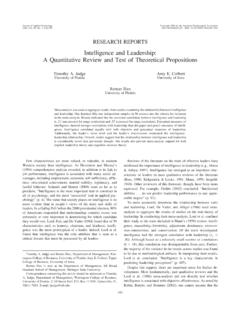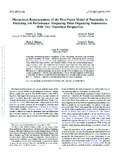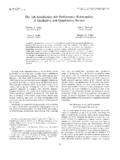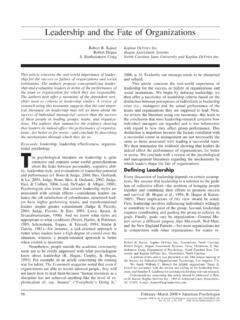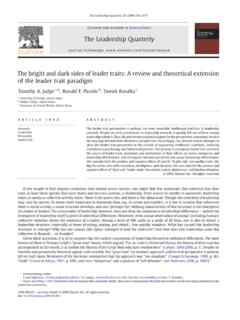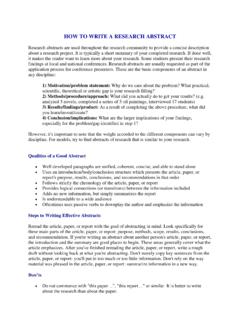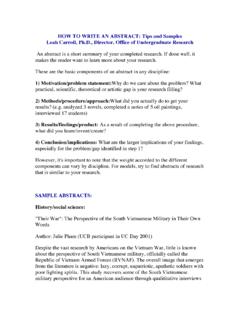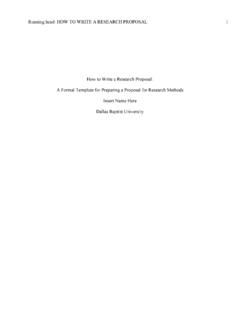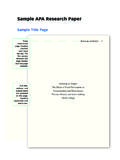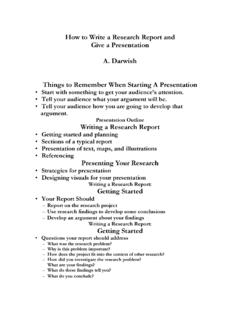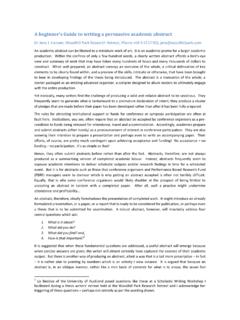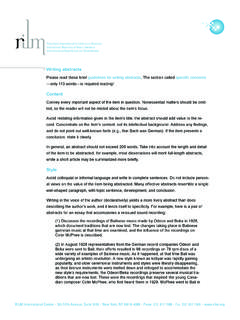Transcription of 1 Running Head: AMBITION On the Value of Aiming High: The ...
1 1 Running Head: AMBITION On the Value of Aiming High: The Causes and Consequences of AMBITION Timothy A. Judge Mendoza College of Business University of Notre Dame John D. Kammeyer-Mueller Warrington College of Business University of Florida In press, Journal of Applied Psychology AMBITION 2 Abstract AMBITION is a commonly mentioned but poorly understood concept in social science research . The current study sought to contribute to understanding of the concept by developing and testing a model in which AMBITION is a middle-level trait (Cantor, 1990) predicted by more distal characteristics but due to its teleological nature, more proximally situated to predict career success. Using a seven-decade longitudinal sample of 717 high ability individuals from the Terman life-cycle study, results indicated that AMBITION was predicted by individual differences conscientiousness, extraversion, neuroticism, and general mental ability and a socioeconomic background variable: parents occupational prestige.
2 AMBITION , in turn, was positively related to educational attainment, occupation prestige, and income. AMBITION had significant total effects with all of the endogenous variables, except mortality. Overall, the results support the thesis that AMBITION is a middle-level trait related to but distinct from more distal individual difference variables that has meaningful effects on career success. Keywords: AMBITION , personality, career success, income, longevity AMBITION 3 On the Value of Aiming High: The Causes and Consequences of AMBITION Occasionally, one encounters a concept that is pervasive yet poorly understood. Arguably, such is the case with AMBITION . One finds myriad references to AMBITION in literature ( The lower still I fall, only supreme in misery; such joy AMBITION finds [Milton, 1667/1831, p.)]
3 81]), history ( Where AMBITION can cover its enterprises, even to the person himself, under the appearance of principle, it is the most incurable and inflexible of passions [Hume, 1688/1858, p. 198), and theology ( Let nothing be done through selfish AMBITION or conceit [Philippians 2:3, New King James Version]). AMBITION is discussed by numerous philosophers, with those seeing it as virtuous (Santayana, Kaufmann) apparently outnumbered by those who perceive it as vicious (Aquinas, Locke, Rousseau). On several occasions, President Barack Obama has referenced AMBITION in his remarks, arguing that AMBITION to achieve extrinsic success represents a poverty of elevation of appearance over substance, celebrity over character, short-term gain over lasting achievement (Obama, 2009).
4 As the foregoing references suggest, AMBITION is often if not generally viewed negatively, though it remains unclear whether it is a virtue or a vice (Pettigrove, 2007). Of course, popular discourse does not always reflect scientific understanding, and apparent dissensus is often clarified by rigorous inquiry. However, in the case of AMBITION , understanding of the concept remains elusive. A search of the PsycINFO database reveals 119 peer-reviewed articles where AMBITION appears in the title or as a keyword. In most of these articles, AMBITION is collectivized ( , corporate or national AMBITION ), directed toward non-work ends ( , mating or parental ambitions, political AMBITION ), or not measured directly ( , AMBITION is conceptualized broadly, or referenced but not measured).
5 In the vocational behavior literature, a few work studies have related AMBITION to career advancement (Ashby & Schoon, AMBITION 4 2010; Howard & Bray, 1988; Jansen & Vinkenburg, 2006; Metz, 2004). In sociology, research , though not focused on AMBITION per se (we define AMBITION shortly), has found that children having high educational aspirations concrete plans to attend college or obtain a certain degree (Sewell, Haller, & Portes, 1969) and high occupational aspirations specific occupations individuals self-identified as their intended career paths (Alexander, Eckland, & Griffin, 1975) obtained higher status and better paying jobs. Though such concrete and specific educational and occupational aspirations may not be identical to AMBITION , these studies do suggest that AMBITION may matter.
6 These research studies notwithstanding, as the foregoing review of the psychology, vocational behavior, and sociology literatures suggests, AMBITION remains an infrequently studied and fragmentary concept. Needed are clearer definitions and more comprehensive considerations of, first, the causes and, second, the consequences of AMBITION . First, where it has been considered, psychologists have generally treated AMBITION as a trait (see Hansson, Hogan, Johnson, & Schroeder, 1983), whereas sociologists have instead considered explicit educational or occupational objectives as a product of parental, social, or socioeconomic environment (see Sewell, Hauser, Springer, & Hauser, 2004). We are aware of no studies that consider both personality and environment sources of AMBITION .
7 Nor are we aware beyond those notable few who view AMBITION as a facet of conscientiousness (Jackson, Paunonen, Fraboni, & Goffin, 1996) or extraversion (Hogan & Holland, 2003) of any studies that have sought to integrate AMBITION with the most influential typology in personality psychology, the Five-Factor Model (FFM). Second, on the consequences of AMBITION , beyond the sociological aspirations literature noted previously, very few studies have linked AMBITION to career success, and we are aware of none that have linked it to intrinsic and extrinsic career success. Is AMBITION a predictor of career AMBITION 5 success, beyond the known benefits of related, broader traits (Ng, Eby, Sorensen, & Feldman, 2005)? Does AMBITION , as some of the philosophical discussions of AMBITION suggest, produce a Pyrrhic victory in that what AMBITION yields (extrinsic success) provides little fulfillment (intrinsic success)?
8 Accordingly, the purpose of the present study is to test a model that accounts for both the causes and consequences of AMBITION . The model considers AMBITION as a middle level trait (Cantor, 1990, p. 735) that, in an Allportian sense, focuses on propriate strivings individuals overarching desire to aspire toward success and improvement over one s current condition (Allport, 1955, p. 49). While such middle level personality traits are not likely as genetically determined or as stable as more distal traits, neither are they as ephemeral or situational as specific goals, behavioral intentions, or attitudes. In conceptualizing the consequences of AMBITION , we consider both extrinsic and intrinsic outcomes. In the next section of the paper, we review various definitions of AMBITION , provide our own definition, and then hypothesize variables that lead to, and result from, AMBITION .
9 Theoretical Background: Definition and Nature of AMBITION Defining AMBITION The first task for a study of AMBITION is to come up with a satisfactory definition of what the construct is and how it relates to other psychological constructs. To this end, Table 1 provides definitions culled from both dictionary and psychological sources. There is a notable consistency in the dictionary definitions. As can be seen, the English language definitions see AMBITION as a desire to achieve ends, especially ends like success, power, and wealth. Central to these definitions is the aspirational nature of AMBITION there is a motivational process at work, AMBITION 6 oriented toward the attainment of outcomes. These definitions make it logical to study AMBITION in the context of career success, and surprising that few such studies have been undertaken.
10 There is also a tradition within psychology research to define AMBITION in terms of goals or plans for accomplishments, as best seen in Locke s (1996) goal-setting theory research , where AMBITION is often mentioned as a source of individual differences in goals (Locke & Latham, 2002; Mento, Locke, & Klein, 1992). However, in many ways the psychological definitions are less consistent than the dictionary definitions, and contain more overlap with already established constructs like conscientiousness (Schwyhart & Smith, 1972). Although the psychological research definitions are more varied than the dictionary definitions, nearly all definitions include habitual setting of goals or goal striving. In an effort to summarize and integrate these definitions, we define AMBITION as follows: AMBITION is the persistent and generalized striving for success, attainment, and accomplishment.
